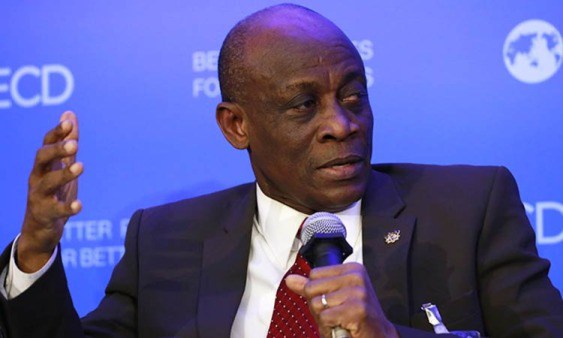We read with interest and concern your article Ghana must fight to keep middle-income status – Terkper in the 3rd December edition of the Business and Financial Times . Unfortunately, your report as attributed to Mr. Seth Tekper, former Minister of Finance misinterpreted what the Country Director of the World Bank said in his Joy TV interview on PM Express with George Wiafe that a review of the economy in some six months’ time may downgrade it to ‘developing country’ status if the debt situation is not checked.
We would be glad if you could kindly publish World Bank’s Country Director, Pierre Laporte’s, answers to the hosts questions on the Classification of Ghana as a Lower Middle Income [economy], his thoughts on Debt and the tagging of Ghana as a Lower middle-income country to correct the misrepresentation in the 3rd December print and online editions.
Reporter’s question: “In classifying Ghana we have moved from a Developing Country to a Lower Income, do you think we have lived up to that expectation of a lower middle income. Some are saying it was purely statistics looking at our challenges we still need that support of a developing country than a lower middle-income country. Did you rush with these assessments?
Pierre’s Answer: From what l can tell you to a large extent, yes, there are some challenges and there are areas where I can give you some examples. If you look at the Human Capital Index, Ghana is among the countries with the best Human Capital Index in Africa. A strong solid Human Capital is a basis of an indicator of where a country is heading or it is. Good infrastructure, Ghana has a very good and solid infrastructure, this is also an indication of where a country is heading or developing. Very positive things have happened and we continue to see that. But there are some areas where Ghana has not lived up to expectations. For instance, I talked to you earlier about revenue collection. A country at this stage of development should be able to do better collecting revenues, l am not saying increase tax rates but find ways of making sure everybody pays. Find ways of making sure the system is fast, using IT platforms to collect taxes faster to pick loopholes and reduce exemptions here and there. Again, we have had these discussions and we will continue to support Government on these. Another area is in investment climate, Ghana’s ranking in the investment climate l believe it is somewhere between around 100 and 120. It is not good enough, because this is a country that has attracted strong FDI over the years, most largely the petroleum sector. But Ghana like modern.
Reporter’s question: I was trying to get your thoughts on Debt, HIPC, HiMIC etc when the World Bank says Ghana is at High Risk of Debt Distress, I know what the text book would say, but what do you actually mean?.
Pierre’s Response: Okay a country that is of high-risk debt distress is generally looked at in terms of what we call the stress test, we generally use different tests to see to what extent given the level of your debt vulnerability if certain things should happen. For instance, at the current debt level Ghana is, if Petroleum prices crash you need money to pay for it, because Ghana is country which relies on petroleum export. When prices crash it reduces your ability to pay your debt in a big way so you are at a high risk. If Ghana is a country which exports Gold, commodities we do a stress test if the price could fall sharply what this would mean for your ability to pay. Domestic revenues, if there was a crisis like Covid and your revenue falls. to what extent will it affect your debt. Because Ghana is a country which depends on commodities a lot, including petroleum, so this puts Ghana in a category of a country where your debt level is at a high risk putting you into stress. Already your debt level at 60 percent of GDP is high but it does not mean all countries at 60 percent of debt to GDP maybe at high risk of debt distress. It depends on what happens when certain events happen and how it affects your ability to repay your debts and because of the structure of Ghana’s economy it makes where the debt is at high risk of debt distress.
Reporter’s question: When are you going to do the next review in terms of the next Debt Sustainability Analysis on Ghana, because we have now seen Ghana is at a high risk of debt distress?
Pierre’s response: It is done regularly and probably will be done in the next 12 months. Normally, each time there is an IMF program as it is a joint exercise between the IMF and the World Bank or a new budget support is coming in, which will probably be 2nd half of 2021, we will do an update.
Reporter’s question: From our Debt numbers and all the statistics you compile, do you see us flipping into a debt distress country?
Pierre’s response: There are risks but l do not think so, personally. Why? Because on the one hand, if you look at the structure of your debt, a large proportion of Ghana’s debt is to multilaterals like World Bank, IMF, bilaterals such EU etc and these are generally long-term debts. Long term debts are cheap because interests are low so the risk is minimized. Secondly another important share of Ghana’s debt is through the Financial markets. And again, financial markets vary over time depending on factors both exogenous and endogenous. But until Covid came the market was quite liquid but it is also to do with the perception of the country and there is always money out there. But to the extent investors feel this a country that is on the right track they will always buy your debt instruments or roll it over. Actually, one of the risks for Ghana is Covid and the financial markets being unstable but l personally believe once things are normalized things would be better for Ghana. Critical point is going back to macroeconomic stability, it is fundamental.
The first thing you do in your strategy if I was doing one is to make sure there is macroeconomic stability. Because when you have macroeconomic stability you not only protect yourself from overspending, maintaining your debt accruals levels, keep deficit at reasonable levels. It also allows you to maintain your debts low, and it also gives a good perception from the markets. If the markets look at Ghana and other countries and sees this is a country where the macroeconomic situation is good, we see they are managing the economy well. The indicators are positive, inflation is coming down deficits are under control, unemployment is fairly low, domestic revenue mobilization is going strong, there will come. So, to the extent that Ghana can maintain a strong and firm macroeconomic stability I do not see it flipping.
Reporter’s question: I know we are now in new categorization as a lower middle-income country, but recently there were recent arguments that Ghana can be classified as HIPIC because its debts are hitting threatening levels. If l use the old scenario, will l be right in classifying Ghana as HIPIC or Ghana is not HIPIC or Ghana can’t be HIPIC?
Pierre’s answer: I will say once to everybody, and categorically Ghana is not a HIPIC country. HIPIC is defined as a Highly Indebted Poor Country. A country at High risk of Debt distress does not mean it is a Highly Indebted Poor Country, that is very important. Because at a 60-63percent debt to GDP ratio does not mean Ghana is a highly indebted country.
High debt countries in Africa, there are a few of them Mauritania, Cape Verde etc which have debt to GDP ratio of nearly 100 percent or above these are highly indebted countries. But HIPIC going back to this which was published recently is false. HIPIC was an exercise that was done several years ago where developing countries, multilaterals and bilaterals came together and said Africa and the rest of the developing world had high debt levels and we want to help these countries. So what we did was that we said all these countries we will forgive part of your debt subject to certain conditions. There was what was called decision point and completion point. At decision we said this country was a HIPIC country and we will work with this country if you did certain things, we will bring down your debt. And Ghana reached completion point many years ago, the story of Ghana’s HIPIC is dead and Ghana is no longer HIPIC country.










